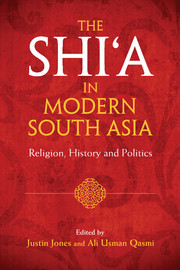Book contents
- Frontmatter
- Contents
- Preface
- Introduction
- 1 Faith Deployed for a New Shiʿi Polity in India
- 2 The Ismaʿili – Isna ʿAshari Divide Among the Khojas
- 3 Local Nodes of a Transnational Network
- 4 Shiʿism, Humanity and Revolution in Twentieth-century India
- 5 Universalising Aspirations
- 6 Muslims, Media and Mobility in the Indian Ocean Region
- 7 Shariʿa, Shiʿas and Chishtiya Revivalism
- 8 Third Wave Shiʿism
- Contributors
- Index
4 - Shiʿism, Humanity and Revolution in Twentieth-century India
Published online by Cambridge University Press: 05 May 2015
- Frontmatter
- Contents
- Preface
- Introduction
- 1 Faith Deployed for a New Shiʿi Polity in India
- 2 The Ismaʿili – Isna ʿAshari Divide Among the Khojas
- 3 Local Nodes of a Transnational Network
- 4 Shiʿism, Humanity and Revolution in Twentieth-century India
- 5 Universalising Aspirations
- 6 Muslims, Media and Mobility in the Indian Ocean Region
- 7 Shariʿa, Shiʿas and Chishtiya Revivalism
- 8 Third Wave Shiʿism
- Contributors
- Index
Summary
Karbala's multiple readings: Imam Husain and the Imamiya Mission in 1930s-1940s India
The martyrdom of the third Shiʿi Imam, Husain ibn ʿAli, at the hands of the army of the ʿUmayyad Caliph Yazid on the plains of Karbala in 61ah is an event that has continued to inform and influence the lives of the world's Shiʿi peoples and societies. For South Asia, studies abound of Muharram, the ritualised commemorations of the martyrdom of Husain and his family. Its practices of mourning and sermonising have been portrayed as sectarian markers by which the Shiʿa have distinguished or even isolated themselves from other communities; or, conversely and perhaps slightly contradictorily, as part of a wider South Asian culture of cross-confessional religious participation within which the Indian Shiʿa have been able to abrogate their minority status. However, the overwhelming focus in such studies upon the social location and ritual particulars of Muharram has meant that sometimes the actual ideas and meanings derived from Karbala have remained comparatively obscure. As conveyed in Michael Fischer's highly influential work on Iranian Shiʿism, the Karbala story has always existed not as a static message but as a ‘paradigm’, a highly adaptable construct able to absorb and project a variety of values and meanings depending on its contexts of transmission and reception. Indeed, while different South Asian religious communities have always interpreted the message of Karbala with variant emphases, it is important to remember that the story of Imam Husain's martyrdom has always carried ‘multiple readings’ even within Shiʿism itself.
This article is an attempt to focus on the esoteric meanings rather than exoteric expressions of the Karbala tragedy in South Asia, through a focus upon what one scholar has termed “Husainology”: the particular interpretation of the attributes assigned to the third Imam, and the basis of his significance for modern believers. The focus here is the distinctive Husainology pioneered from the 1930s onwards by arguably the most influential Shiʿi scholar of twentieth-century South Asia: the mujtahid Sayyid ʿAli Naqi Naqvi (1905–1988; often colloquially known as Naqqan Sahib).
- Type
- Chapter
- Information
- The Shi‘a in Modern South AsiaReligion, History and Politics, pp. 80 - 104Publisher: Cambridge University PressPrint publication year: 2015
- 1
- Cited by



